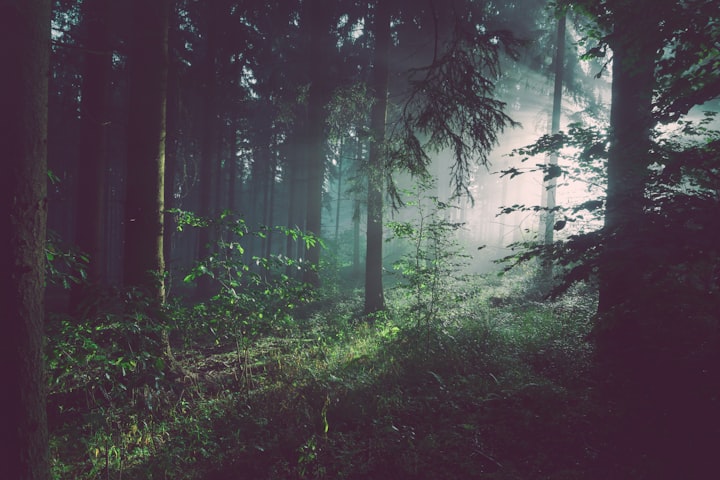
It’s easy to tell when people haven’t been around their homes. An area of common use collects dust, a chill sneaks into every corner and crack. Usually these places have friends, other houses alive and well just next door, or across the street. An ambient warmth can spread across a city, just enough to make up for the emptier places. Without it, you’d get a shiver across your back walking past every abandoned building. Some people still do.
But there are houses too far from abandoned. They are disgraced. Disowned. Such a crime is unforgivable, and, rather than a sneaking chill, rakes its frozen talons across your spine. Something bad happened here, and you just want to forget it. The city simply couldn’t bear the weight of such a burden, and instead shifts, moves like a roiling wave, away from it, in the hopes that the chill will subside when sacrificed to nature. We cannot keep this memory, it says, so we pass it on to you.
This house has met an unfortunate end, one worse than its own death. Most houses within the city, and its warmth, lay in there deathbed, well used and loved. They are gutted, killed, and burned, but they, in their deaths, are loved. Such a fate would be heaven for the house, such a fate would be openly welcomed and celebrated. Someone loved me! It would cry as it’s limbs were turned in on themselves, someone cared for me and wanted me to rest. But instead, it has been forgotten, lain to die a slow and rotting death. Any who would remember the house, for what it really was, is gone.
The hope for someone to return slowly wilts. The last thing it has seen was a car and later, another, streaking from this path, onto the streets of the city, making no attempt at a passing glance or goodbye. No one is left, all breaths die out, and the city hears what has happened in this house. The house is pushed into the forest, lost to all it could ever offer its redemption. It tries to keep itself in higher spirits, but the one who left offered no help by closing the door. Like a knife, the draft punctures the houses insides, and stays with a stubborn grip. The water that once revitalized the house is now the enemy. It leaks through joints and places that were never meant to soak. Weaker boards and cushions dampen and turn foul. This feeling of dread creeping in, in places we never anticipate, reflects the way the people in the house lived, on edge and with no peace of mind. Any chance for this house to be cared for again had passed.
It is angry. The walls and roof creak madly, thrashing and writhing against its original blueprint borders. It shouts out curses in lightning storms, swearing to make so much noise that the city will never forget what was here. The last sounds from the house before the cars were gone was shouting like this. Before the cool, it was hot, so hot, with fire and rage and muscle and blood, turning on one another and overlapping in a great cacophony. The house matches this feeling, of noise, to try to expell what threatens to topple it. It does not last, for storms end, and winds slow, and there is nothing left to shout, no words to say.
In short time, the water reveals its plan. The damp, dripping crevices are an invitation. Mildew adds texture to the smooth, concrete floor under the ground, vines curl and twist up the sides of the walls, attempting to hide the house away from the city’s eyes. Mold attacks cracks and angles, threatening to choke the house from the inside out. And the house watches what fate lay for the buildings who do not die from a loving death: disease. The house offers what it can spare. Please, take the food from the cupboards, so that I may stand; let me keep my roof, and take these clothes and tables and chairs, just let me stay one more day. The taste of this stale air, the desperation to keep, to trade, and to have, is a feeble sound. Gentle creaks and groans can be heard as the limbs buckle, and the house pleads to stay, and be loved again before death. The people in this house traded. Please leave me be, and I will do the same. Stay just one more week, one more day. They traded in this way, to stay together. The shouts of the house become wails, cries to save what is left of it, to give back what it has lost; there is no answer, and there is silence.
One morning, something has changed. A new smell, a new sight, a new sound. Rather than the sour, scent of decay, there is a scent that is fresh, and cleansing. No longer are the poisonous molds growing, but the calming moss and lichen, spreading over the floors and walls like a healing salve. Grasses hug the edge of the outer walls, waving a cheerful hello. The furious splotches of glossy red on the counter and floor fade, past deep burgundy, past maroon, ending at an unassuming grey. The forest has seen what was done to this house by the hands of the city. We’re sorry, say the moss, the lichen, the grass, the trees. We’re sorry, and we love you. You have been left here, unknown, unloved. But we love you now, and you may rest.
The house knows now. It has not been loved by its owners, for how could they love the place that brought them so much pain? It was the sight, that night, of terror and fear, on the owner’s face. It saw no joy in the house, no worry for it being left to rot. The house was not loved. But how could you find any solace in never being loved? In finding your exsistence served no happiness, no peace, in anyone’s life?
The life of the forest will live in with you, the house is told. You rot, but from you new life is sprung, promising to keep your story well told. A house, with the strength of a forest. A forest that loves your disease, your rot, and your disgrace. This doesn’t have to be your end.
The house weeps. It was not loved, but was not meant to be loved. The owners had passed over this time in their lives, not because the house brought the pain, but from each other. They were rotting inside, just like it, trading parts of themselves to keep staying, keep living this way. But they learned they didn’t need the love they thought they did. They had the same revelation that the house has on this very day. And for that, the house is thankful.
It has been many years. Today, the house sags. It makes no sound. There are no walls, there is no floor. The roof imploded a long time ago, bent under the weight of foliage and rot. Plants have claimed the sharp angles and corners, smoothing every notion of order into a curving shape. The house does not anger when storms fall, does not shout with the wind. Its foundation settled and rested lower into the ground, as if deciding to sleep for the very first time. The windows hold no glass, instead allowing the breeze to dance between the slopes and dips of the house and its insides. Mushrooms grow on lower ground, mingling and getting to know this place. A once incessant creaking door lies on the porch, taken over by rolling mosses.
The forest loves this house. The house is not disgraced. It is not angry. It is not in fear, and neither is it feared. It is happy.
About the Creator
Isabel
I like to write and that's about it.






Comments
There are no comments for this story
Be the first to respond and start the conversation.